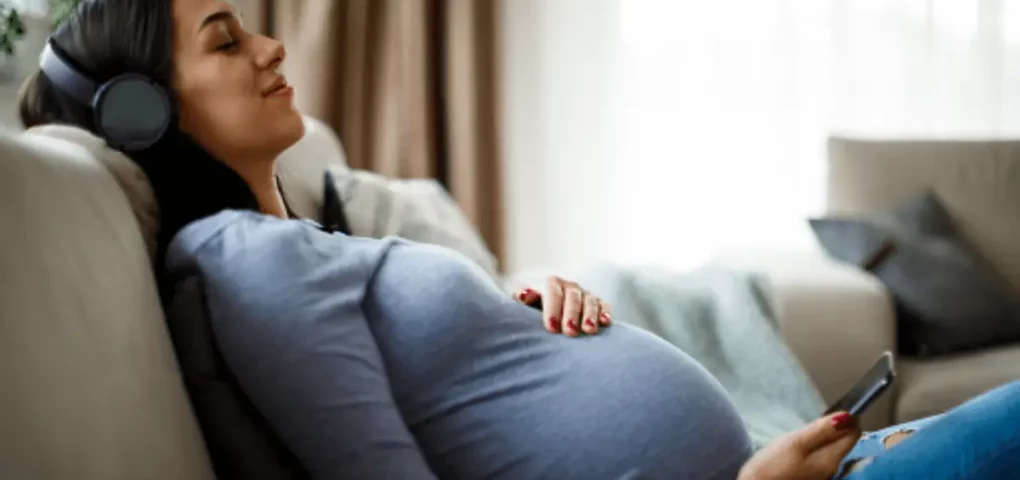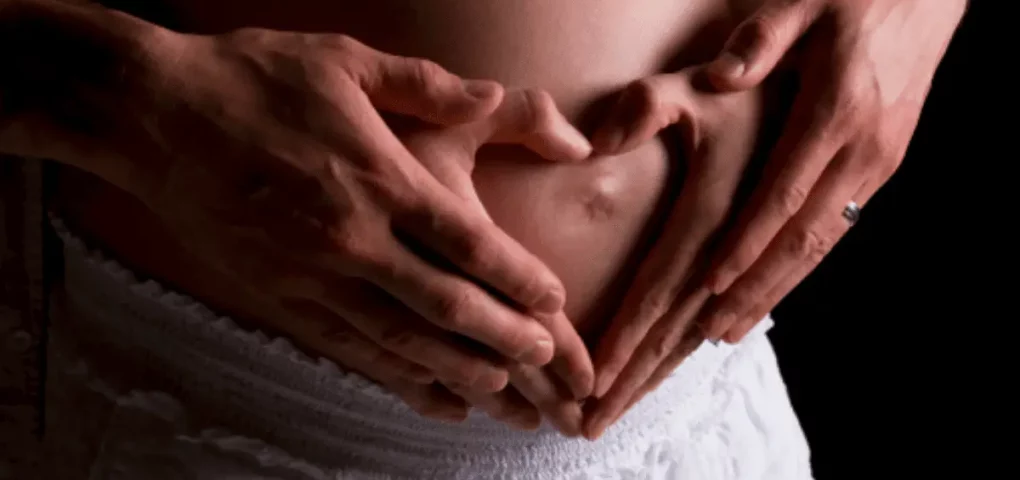
When can a fetus hear? This is a question that many expectant parents have.
Did you know that a fetus can start to hear as early as the 16th week of pregnancy? The sense of hearing is one of the earliest to develop in a baby, and by the time they are born, they will have heard millions of sounds.
In this blog post, we will discuss fetal hearing development and when a fetus can start to hear different sounds. We will also talk about how parents can help their babies develop their sense of hearing during pregnancy.
Hearing Development for Unborn Babies

The sense of hearing is one of the earliest to develop in a baby. By the time they are born, they will have heard millions of sounds. However, it’s important to note that a baby’s ears are sensitive.
Therefore, proper care for the baby’s ears, even in utero, should be considered. Loud sounds and loud noise should be avoided at all costs.
So, when can a fetus hear?
A baby’s hearing develops as early as the 16th week of pregnancy. The development of hearing starts with the inner ears, which are fully developed by the 20th week.
However, it takes the entire pregnancy for all the connections between the inner ear and the brain to be made. This is why a newborn baby’s hearing may not be perfect at birth.
A baby’s neck is not strong enough to support its head until the 32nd week of pregnancy. This is why you will often see newborns with tubes in their ears – these are placed there to keep the pressure equal on both sides of the baby’s eardrums and to prevent any damage that could be caused by fluid build-up.
Babies start to make sounds around the 28th week of pregnancy. You may be able to hear your baby’s heartbeat or hiccups if you place a stethoscope on your stomach.
By the time they are born, they will have already learned how to make all kinds of different sounds. A few words here and there will make your baby get used to sounds from the outside world!
There are many things that can affect a baby’s hearing development. For example, exposure to loud noises such as a dog barking or a loud concert can damage a baby’s hearing.
That’s why it’s important for pregnant women to avoid loud noises when possible. When a baby hears loud sounds, it might flinch in the womb. Therefore, be careful about the sounds you expose your baby to!
If you’re worried about your baby’s hearing development, talk to your doctor. They can perform tests to assess your baby’s hearing and give you peace of mind.
Since babies can hear sounds, make sure to take care of your baby’s hearing from the first, second, and third trimester until your baby is born.
What Do Babies Hear In The Womb?
The mother’s voice is one of the first things a baby hears in the womb. Studies have shown that babies respond to their mothers’ voices while still in the womb.
This may be because mothers talk to their unborn babies, sing to them, and read to them during pregnancy. As a baby’s hearing continues to develop, moms should be careful about the loud noise.
Babies also respond to music when they’re in the womb. In fact, research has shown that babies can hear different pitches and rhythms when they’re still in the womb.
So if you want to play some music for your baby, go ahead! Just make sure it’s not too loud – remember, you don’t want to damage your baby’s hearing!
Playing classical music, such as Mozart, may also help your baby’s development. One study found that babies exposed to classical music in the womb had better language skills when they were tested at age three.
Remember, though, that just because you know when can a fetus hear doesn’t mean you should also think they can understand what you’re saying. That won’t happen until after birth! So keep talking to your little one – they are listening!
Even though outside noises do not make sense to your baby, it is still good for them to be exposed to all the different sounds. This helps with their auditory development and gets them used to hearing different pitches and tones.
A baby’s ears continue to develop up to 35 weeks in the womb. Therefore, keeping track of fetal development is necessary.
Things you can do to help expose your baby to different sounds

Play music of different genres
Playing music of different genres can help introduce your baby to different sounds and melodies. For example, moms can play classical music from time to time. Mothers should listen to a variety of music when pregnant, and even after the baby is born.
However, moms should avoid a sound loud enough to cause hearing loss for their babies. Hearing loss is manifested when a baby does not respond to loud sounds or when there is a delay in the development of speech and language. If you have any concerns about your baby’s hearing, consult with your doctor.
Turn on the radio
Listening to the radio is another great way to expose your baby to different sounds. You can try different stations or leave it on one that you enjoy. As the pregnancy progresses, you can have your growing baby listen to more sounds, especially during the first and second trimesters. Sound waves will reach your baby and help it in terms of processing sounds.
Make household noise
Your baby will become accustomed to the sounds they hear regularly, so don’t be afraid to make some noise around the house! Things like vacuuming, running the dishwasher, taking out the trash, and other noises at home are all perfectly fine.
Record your voice
Recording yourself talking can help introduce unborn babies to the sound of human voices. You can even read them a book! Just make sure the recording is at a low volume so it doesn’t hurt their ears.
Talk in different accents
Talking in different accents can expose babies to the various tones and rhythms found in languages other than their native language.
Have family members talk near your belly
Having family members talk near your belly will help introduce your baby to the different voices of people they will be hearing a lot after birth! Hearing lots of different voices early on will help with language development later on.
As we mentioned before, outside noises don’t make much sense to a fetus until around week 28. However, that doesn’t mean they aren’t listening! The fetal ear is fully developed by week 20, so your little one can hear all the good stuff (and bad stuff!) going on around them.
How Does A Fetus's Ears Develop?
The ear starts to form when the baby’s cells divide and begin to specialize. The ears will start as little buds on each side of the head, and they will grow bigger and more complex as the baby grows. By the second trimester, the ear is fully formed with all of its parts in place.
The auditory system starts to develop during the fourth week of gestation. This is when the inner ear begins to form, and by the eighth week, the cochlea (the part of the inner ear that converts sound into electrical signals for the brain) has started to grow.
The fetal ear begins to develop at about six weeks gestation when tiny bumps called somites appear on either side of the embryo. These bumps will eventually turn into muscle, cartilage, and bone to form the structures of the head and neck.
The first things to form are the three tiny bones of the middle ear: the incus, malleus, and stapes. Next, the outer ear begins to take shape when tissue grows around the opening of the ear canal. By week eight, the cartilage starts to form the inner ear structures. This is an amazing process to behold!
By the second trimester, your baby can hear everything going on around them! However, since outside noises don’t make much sense to a fetus until around week 28, it’s mostly mommy and daddy’s voices that your little one will hear in the womb. Keep talking to your little one! They love hearing your voice.
By about 12 weeks, your baby’s hearing should be fully developed. The auditory nerve starts connecting to the brain at about 12 weeks gestation, so by week 16 or 17, your baby will start reacting to certain sounds! You may have even felt them move when you listened to music or when someone was talking near your stomach.
However, it’s not until around 20-22 weeks of pregnancy that they will start to respond to sounds in utero. The reason for this is that the amniotic fluid surrounding your baby acts as a natural amplifier, making outside noises louder than they would be if your baby was born prematurely.
Interestingly, research showed that babies could actually learn a language in utero! At week 20, your baby’s hearing is fully developed, and they will be able to hear all the sounds around them! This means that if you want to play music for them or have a conversation with them, now is the time!
Your little one’s hearing will continue to develop after they are born, so don’t worry if they don’t seem to respond to sound immediately. It may take some time for them to get used to the new noises in their environment. Just keep talking and singing to them and soon enough they’ll be responding back!
Ear Complications That Might Develop In The Womb

It is important to keep in mind that although fetal hearing development is a fascinating process, there are still risks associated with it. For example, if the fetus has a congenital disability or genetic disorder, their hearing may be impaired.
Additionally, certain environmental factors can also affect fetal hearing development. Make sure to talk to your doctor about any concerns you have and always follow their recommendations.
There are now many peer-reviewed studies that investigate all the layers of fetal hearing development. Researchers concluded that scientists could track how sounds are processed from the time they enter the womb until they exit out of the baby’s mouth. This information can be used to help disease control and track pregnancies more effectively.
Fetal hearing development is an amazing process that should be monitored closely. It can give us clues about a baby’s later development and potential problems. Make sure to talk to your doctor if you have any concerns about fetal hearing development during your pregnancy. They will be able to help you get the answers that you need.
Conclusion
So, when can a fetus hear? A baby in the womb can start hearing noises from the outside world at around 16 weeks gestation. However, they cannot understand what these noises mean until after birth. People’s voices, low-pitched sounds, and other sounds do not make sense to them yet.
Nevertheless, it is beneficial for babies to be exposed to sound and noise as early as possible. This helps to stimulate their brain development and prepare them for the world outside the womb. Start talking to your baby and playing music for them as soon as possible – it is never too early or too late to start!
Always remember that you can speak to your doctor or midwife if you have any concerns about your pregnancy. They will be able to help you get the answers that you need. As much as possible, try to relax and enjoy this special time in your life.
Monitoring your pregnancy and your baby’s development is an important part of ensuring a healthy and happy outcome for both of you. Therefore, it is something you should prioritize.


Leave a Reply